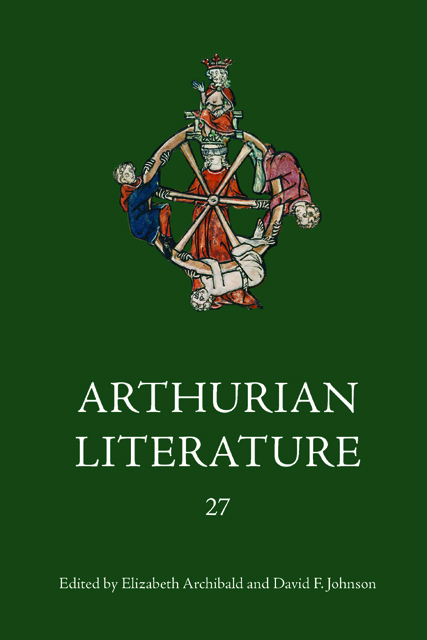Book contents
- Frontmatter
- Contents
- General Editors’ Foreword
- List of contributors
- I Commemoration in La Mort le roi Artu
- II ‘… “if indeed I go”’: Arthur’s Uncertain End in Malory and Tennyson
- III The Intruder at the Feast: Negotiating Boundaries in Medieval Insular Romance
- IV What Women Really Want: The Genesis of Chaucer’s Wife of Bath’s Tale
- V Monstrous Appetite and Belly Laughs: A Reconsideration of the Humour in The Weddyng of Syr Gawen and Dame Ragnell
- VI Speaking (of) Treason in Malory’s Morte Darthur
- VII Lancelot of the Laik: A Scottish Mirror for Princes
- VIII Prince Arthur’s Archers: Innovative Nostalgia in Early Modern Popular Chivalry
- Miscellaneous Endmatter
General Editors’ Foreword
Published online by Cambridge University Press: 18 February 2023
- Frontmatter
- Contents
- General Editors’ Foreword
- List of contributors
- I Commemoration in La Mort le roi Artu
- II ‘… “if indeed I go”’: Arthur’s Uncertain End in Malory and Tennyson
- III The Intruder at the Feast: Negotiating Boundaries in Medieval Insular Romance
- IV What Women Really Want: The Genesis of Chaucer’s Wife of Bath’s Tale
- V Monstrous Appetite and Belly Laughs: A Reconsideration of the Humour in The Weddyng of Syr Gawen and Dame Ragnell
- VI Speaking (of) Treason in Malory’s Morte Darthur
- VII Lancelot of the Laik: A Scottish Mirror for Princes
- VIII Prince Arthur’s Archers: Innovative Nostalgia in Early Modern Popular Chivalry
- Miscellaneous Endmatter
Summary
Volume 27 of Arthurian Literature ranges from early Celtic sources and analogues of Arthurian plots to popular interest in King Arthur and chivalry in sixteenth-century London, from the Vulgate Cycle Mort Artu to Tennyson's Idylls of the King, and includes discussion of shape-shifters, loathly ladies, attitudes to death and funerals, treason and Scottish politics. In the first essay Emma Campbell discusses commemoration in the Vulgate Cycle Mort Artu, arguing that the funerary epitaphs described there can only be partial representations of their subjects, just as the Mort itself cannot offer full closure to the Arthurian legend. Andrew Lynch also deals with death and endings in his comparison of the scene of Arthur's death in Malory's Morte Darthur and in Tennyson's Idylls of the King; he shows how unconventional these bleak descriptions are in comparison with contemporary rituals of royal deaths and funerals. The next three essays concentrate on Middle English texts about shapeshifters and loathly ladies, many featuring Gawain. Aisling Byrne considers the sources and functions of the well-known motif of the intruder at the feast which also appears in Irish tales such as the Ulster Cycle; her main focus is on Middle English Gawain romances, but she notes that this motif raises ‘some of the most characteristic concerns’ of the romance genre. P. J. C. Field looks at some of the same Gawain romances in his wideranging analysis of the sources and analogues of Chaucer's Wife of Bath's Tale, which is often (though not always) linked to the Arthurian world. Sue Niebrzydowski's contribution focuses on one of these analogues, the fifteenth-century Weddyng of Syr Gawen and Dame Ragnell, paying special attention to its use of humour and its emphasis on food and table manners. The two essays that follow are concerned with the political and social context of two late medieval Arthurian narratives which show striking divergences from their French sources. Megan Leitch argues that Malory's well-documented interest in fellowship and loyalty is matched by a very strong interest in treason, which is ‘resonant both for Malory and for the fifteenth-century English cultural imaginary’. Karen Robinson's essay deals with the fragmentary Lancelot of the Laik, a little-known Scottish adaptation of part of the thirteenth-century French Lancelot do Lac.
- Type
- Chapter
- Information
- Arthurian Literature XXVII , pp. vii - viiiPublisher: Boydell & BrewerPrint publication year: 2010



